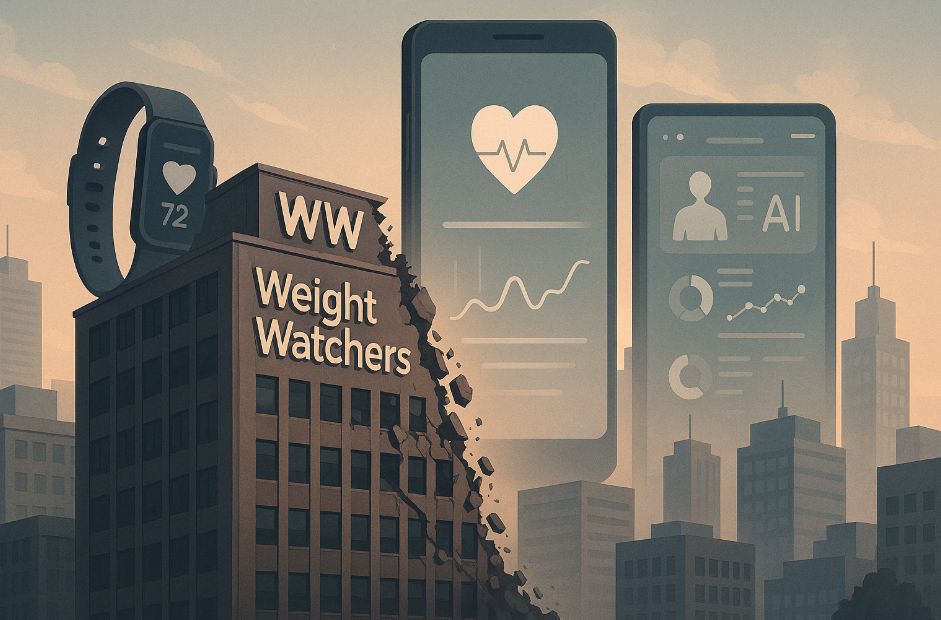In recent months, speculation has been mounting over the financial health of WeightWatchers, officially known as WW International. Once a household name in weight loss and wellness, the company has seen significant shifts in strategy, public perception, and revenue generation.
The question now circulating among investors, health professionals, and loyal members alike is this is WeightWatchers going out of business? This article explores the current state of WW International, the contributing factors to its decline, and how its trajectory could impact the broader wellness industry, particularly in the UK.
Is Weightwatchers Really Going Out of Business in 2025?

The short answer is non WeightWatchers is not officially going out of business as of 2025. However, its financial struggles are undeniable. According to WW International’s most recent earnings report, the company’s revenue continues to fall short of expectations, and membership numbers are steadily declining.
WeightWatchers’ stock price has plummeted by more than 70% in the past year, which has fuelled speculation among analysts and market watchers about the company’s sustainability.
In March 2024, WW International made headlines after announcing a round of layoffs and further restructuring plans. While these moves are often seen as cost-cutting measures to preserve operations, they have also raised questions about the company’s long-term viability.
What Led to Weightwatchers’ Recent Financial Troubles?
Decrease in Subscription Revenue
WeightWatchers’ traditional business model relied heavily on paid subscriptions and in-person meetings. With the digital wellness revolution, this model has come under pressure. Consumers are now leaning towards app-based solutions that offer more personalisation, flexibility, and often, lower costs.
Poor Stock Market Performance
WW International has experienced a prolonged downturn in stock performance. The company’s stock, which once traded above $100, dropped below $10 by the end of 2024. This drastic fall has eroded investor confidence, adding more pressure on the brand’s leadership to act decisively.
Expensive Strategic Pivots
In 2023, WW International attempted to pivot towards medical weight loss programmes, including partnerships with companies providing GLP-1 medications such as Ozempic. However, the acquisition of Sequence, a telehealth platform, cost nearly $132 million a hefty investment that has not yet yielded substantial returns.
How Has the Weight Loss Industry Evolved in Recent Years?
Rise of Digital Health Platforms
The weight loss industry has witnessed a dramatic shift in the last decade. Traditional methods like group meetings and calorie counting have given way to AI-driven health apps, telehealth services, and holistic wellness tracking tools.
Focus on Preventative and Mental Health
Today’s wellness consumer is looking for more than just a number on the scale. Emotional well-being, body positivity, and preventative health measures now take centre stage. Brands like Noom and Second Nature offer cognitive behavioural support alongside nutrition plans, addressing this shift.
Competitive Pressure from Startups
Startups that leverage data science and machine learning to personalise user experiences are taking the market by storm. These nimble competitors have disrupted the business models of legacy companies like Weight Watchers.
What is the Impact of Ww International’s Decline on Its Uk Operations?

Reduction in Local Events and Coaches
WeightWatchers has notably scaled back its UK-based physical events and coaching programmes. This shift to digital-first solutions has alienated long-time members who valued face-to-face support.
Decrease in Brand Trust Among UK Consumers
The news of financial instability has affected consumer trust in the UK. Reviews and testimonials suggest members are concerned about ongoing service availability and product support.
Challenges with Market Relevance
With more UK residents opting for apps like Second Nature and MyFitnessPal, WW is finding it difficult to remain relevant in a landscape that now prioritises convenience and integrated tech support.
How is Weightwatchers Adapting to Survive the Shifting Market?
Transition to Digital Programmes
WeightWatchers has tried to stay afloat by investing in its digital infrastructure. Its app now includes personalised meal plans, activity tracking, and integration with wearables.
Inclusion of Prescription-Based Weight Loss
In a bold move, WW began offering access to GLP-1 medications like Wegovy through its new telehealth platform. This shift is part of a broader strategy to align with medical approaches to obesity management.
Internal Restructuring and Downsizing
Leadership has introduced major restructuring efforts, including layoffs and executive changes. While this may cut costs, it has also created internal disruptions that are yet to stabilise.
What Could the Collapse of Weightwatchers Mean for Competitors?
Opportunity for Market Expansion
If WeightWatchers were to close down or shrink further, companies like Noom, Slimming World, and Second Nature could benefit from increased customer migration.
Influence on Pricing Strategies
A major player’s exit could lead to shifts in pricing and service offerings among competitors looking to capture the orphaned customer base.
Changes in Consumer Expectations
WeightWatchers’ struggles highlight the growing demand for holistic, flexible, and digital-first wellness solutions. Competitors are already capitalising on this insight.
Could Weightwatchers File for Bankruptcy or Restructure Its Business?

Potential for Chapter 11 Bankruptcy
If revenue continues to drop, WW International might consider filing for Chapter 11 bankruptcy protection in the United States. This would allow the company to reorganise its debts while continuing operations.
More Likely: Strategic Restructuring
Industry experts believe WeightWatchers will lean towards further restructuring rather than total shutdown. This may include selling off non-core assets, refining service lines, or forming new partnerships to regain profitability.
Stakeholder Impact
If restructuring happens, members could see temporary service interruptions, and investors may face losses. Vendors and partners might also renegotiate terms or withdraw altogether.
What Lessons Can Investors and Wellness Brands Learn From Weightwatchers’ Decline?
Adaptation is Critical
Companies must adapt to shifting consumer preferences swiftly. Failure to innovate has left many legacy businesses, including WeightWatchers, lagging behind.
Diversification Reduces Risk
Brands overly reliant on one revenue stream are vulnerable. Companies should explore adjacent sectors and revenue models to safeguard against market disruption.
Trust and Transparency Matter
Consumers today are highly responsive to brand authenticity. Wellness brands that build and maintain trust through transparency will be better positioned in uncertain times.
Why Did Weightwatchers Shift Focus to Medical Weight Loss Solutions?
Historical Approach to Weight Loss
WeightWatchers built its reputation on behaviour-based weight loss programmes, group coaching, and its unique point system. However, in recent years, this approach began to lose momentum in the face of newer, tech-savvy wellness solutions.
Influence of Medical Trends
As medications like Ozempic and Wegovy gained attention for their effectiveness in managing obesity, WeightWatchers saw an opportunity to remain relevant. The acquisition of Sequence marked a turning point, signalling a shift toward medically assisted weight management.
Business Opportunity and Market Demand
Rising global obesity rates and growing demand for clinically backed weight loss have opened new avenues. By introducing medically prescribed treatments, WW International hopes to tap into a new, profitable market segment while redefining its brand identity.
How Are Long-time Members Reacting to the Changes at Weightwatchers?

Mixed Reactions from Loyal Members
Some loyalists appreciate the shift toward innovation, embracing the digital and medical advancements. However, others feel alienated, expressing frustration over the disappearance of in-person meetings and community support that once defined the brand.
Concerns Over Brand Identity
For many, WeightWatchers symbolised a supportive and holistic approach to wellness. The focus on pharmaceuticals has sparked concerns that the brand is drifting away from its core values.
Impact on Retention and Word of Mouth
Member dissatisfaction has translated into lower retention rates and less positive word-of-mouth marketing. Online forums and reviews reveal that while new customers are exploring WW’s digital offerings, long-term users are reconsidering their loyalty.
Conclusion
WeightWatchers is not officially going out of business, but it’s facing significant challenges that could determine its long-term future. From financial strain to consumer migration and the evolution of wellness trends, the brand stands at a critical crossroads.
For UK consumers and industry stakeholders, WW International’s trajectory offers valuable insights into the broader transformations sweeping through the wellness and weight loss sectors.
FAQs WeightWatchers Going Out of Business
What is the current membership count of WeightWatchers?
As of early 2025, WeightWatchers has reported a decline to under 3.5 million subscribers globally, down from over 5 million in previous years.
Is Slimming World gaining market share from WeightWatchers?
Yes, particularly in the UK, Slimming World has seen increased enrolment amid concerns over WeightWatchers’ business model and digital transition.
What are the key differences between Noom and WeightWatchers?
Noom focuses on behavioural psychology and digital tracking, whereas WeightWatchers has traditionally relied on point-based food tracking and community support.
Are WW’s new weight loss drug services available in the UK?
As of now, most of the telehealth services involving GLP-1 drugs are only available in the US. UK availability remains uncertain.
Is WeightWatchers planning to shut down its UK branches?
There is no official confirmation, but several in-person services in the UK have already been reduced or discontinued.
How do wellness apps like Second Nature compare to WW?
Second Nature offers NHS-backed support with a focus on lifestyle coaching and habit change, making it more appealing to modern users than WW’s older frameworks.
Can investors still buy WW International stock?
Yes, WW stock is still publicly traded, but experts caution potential investors due to high volatility and uncertain future outlook.









Leave feedback about this